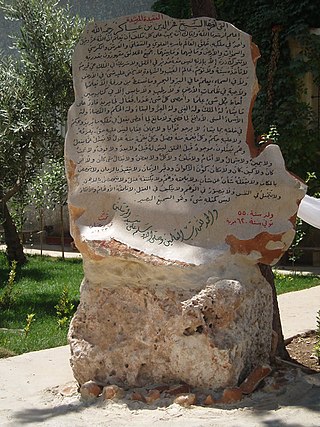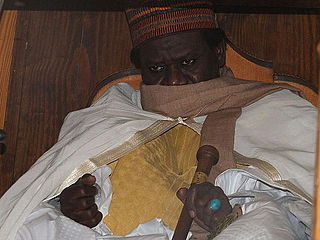Related Research Articles

Senegal, officially the Republic of Senegal, is the westernmost country in West Africa, situated on the Atlantic Ocean coastline. Senegal is bordered by Mauritania to the north, Mali to the east, Guinea to the southeast and Guinea-Bissau to the southwest. Senegal nearly surrounds The Gambia, a country occupying a narrow sliver of land along the banks of the Gambia River, which separates Senegal's southern region of Casamance from the rest of the country. Senegal also shares a maritime border with Cape Verde. Senegal's economic and political capital is Dakar.
A marabout is a descendant of the Prophet Muhammad and a Muslim religious leader and teacher who historically had the function of a chaplain serving as a part of an Islamic army, notably in North Africa and the Sahara, in West Africa, and (historically) in the Maghreb. The marabout is often a scholar of the Qur'an, or religious teacher. Others may be wandering holy men who survive on alms, Sufi Murshids ("Guides"), or leaders of religious communities.

Ousmane Sembène, was a Senegalese film director, producer and writer. The Los Angeles Times considered him one of the greatest authors of Africa and he has often been called the "father of African film".
Sunni Ali, also known as Si Ali, Sunni Ali Ber, reigned from about 1464 to 1492 as the 15th ruler of the Sunni dynasty of the Songhai Empire. He transformed the relatively small state into an empire by conquering Timbuktu, Massina, the Inner Niger Delta, and Djenne.

Cheikh Anta Diop University, also known as the Cheikh Anta Diop University of Dakar, is a university in Dakar, Senegal. It is named after the Senegalese physicist, historian and anthropologist Cheikh Anta Diop and has an enrollment of over 60,000.

Hadji Oumarûl Foutiyou Tall, born in Futa Tooro, present-day Senegal, was a Senegalese Tijani sufi Toucouleur Islamic scholar and military commander who founded the short-lived Toucouleur Empire, which encompassed much of what is now Senegal, Mauritania, Guinea and Mali.

Ibrāhīm Niasse (1900–1975)—or French: Ibrahima Niasse, Wolof: Ibrayima Ñas, Arabic: شيخ الإسلام الحاج إبراهيم إبن الحاج عبد الله التجاني الكولخي Shaykh al-'Islām al-Ḥājj Ibrāhīm ibn al-Ḥājj ʿAbd Allāh at-Tijānī al-Kawlakhī —was a Senegalese major leader (wolof) of the Tijānī Sufi order of Islam in West Africa. His followers in the Senegambia region affectionately refer to him in Wolof as Baay, or "father."

Yusuf bin Ismail bin Yusuf bin Ismail bin Muhammad Nâsir al-Dîn an-Nabhani (1849–1932) born in Ijzim in Palestine, was a Palestinian Sunni Islamic scholar, judge, prolific poet, and defender of the Ottoman Caliphate. He died in Beirut.

Mohammad Akram Nadwi is a British Islamic scholar and the Dean of Cambridge Islamic College, principal of Al-Salam Institute, and an Honorary Visiting Fellow at the Markfield Institute of Higher Education. He is the author of the 43 volume biographical dictionary called Al-Wafa bi Asma al-Nisa, which chronicles the lives of 10,000 female hadith scholars and narrators.

Senegalese literature is written or literary work which has been produced by writers born in the West African state. Senegalese literary works are mostly written in French, the language of the colonial administration. However, there are many instances of works being written in Arabic and the native languages of Wolof, Pulaar, Mandinka, Diola, Soninke and Serer. Oral traditions, in the form of Griot storytellers, constitute a historical element of the Senegalese canon and have persisted as cultural custodians throughout the nation's history. A form of proto-Senegalese literature arose during the mid 19th century with the works of David Abbé Boilat, who produced written ethnographic literature which supported French Colonial rule. This genre of Senegalese literature continued to expand during the 1920s with the works of Bakary Diallo and Ahmadou Mapaté Diagne. Earlier literary examples exist in the form of Qur’anic texts which led to the growth of a form African linguistic expressionism using the Arabic alphabet, known as Ajami. Poets of this genre include Ahmad Ayan Sih and Dhu al-nun.

Abd al-Wahhab al-Sha'rani was a highly influential Egyptian scholar. He was an eminent jurist, traditionist, historian, mystic and theologian. He was one of the Islamic revivalists and scholastic saints of the sixteenth century. He is credited for reviving Islam and is one of the most prolific writers of the early Egyptian-Ottoman period. His legal, spiritual, and theological writings are still widely read in the Muslim world today. He is regarded as "one of the last original thinkers in Islam." He was the founder of an Egyptian order of Sufism, eponymously known as Šaʿrāwiyyah. The order gradually declined after Shaʿrani's death, although it remained active until the 19th century.

Hu Songshan (1880–1955), a Hui, was born in 1880, in Tongxin County, Ningxia, China. His Muslim name in Arabic was Sa'd al-Din. Although he was born Sufi and turned Wahhabi, he changed his views and turned his back on Wahhabism after a Hajj to Mecca and later became an important imam, scripturalist, and leader of the Yihewani Muslim sect in China. He was influential and played an important role in Chinese Islam in this position as he propagated reformist doctrines in Ningxia in his later life. Hu also played a role in rallying Muslims against the Japanese invasion of China.

Women in Senegal have a traditional social status as shaped by local custom and religion. According to 2005 survey, the female genital mutilation prevalence rate stands at 28% of all women in Senegal aged between 15 and 49.
Religion and beliefs occupy an important place in the daily life of the nation of Senegal. The majority of citizens follow Islam. In 2013, 6% of the population followed indigenous beliefs, while 2% followed Christianity.
The Zawaya are tribes in the southern Sahara who have traditionally followed a deeply religious way of life. They accepted a subordinate position to the warrior tribes, whether Arab or Berber, who had little interest in Islam. The Zawaya introduced Sufi brotherhoods to the black populations south of the Sahara. The jihad movements of the Fula people in the eighteenth and nineteenth centuries have their origins with the Zawaya. Today the Zawaya are one of the two noble castes of Mauritania.
Saʽid Hawwa (1935–1989) was a prominent Syrian Hanafi scholar, a symbol of resistance to Hafez al-Assad and a leading member and prominent ideologue in the Muslim Brotherhood of Syria. Hawwa authored a large number of books that dealt with the proper organizational principles and structures for Islamist organizations, the proper spiritual and practical training for Muslim activists, and issues of interpretation, jurisprudence, and creed in Islam. As a high-ranking member of the Syrian Brotherhood, he was involved in the escalating unrest directed against the Ba`thist regime throughout the 1960s and 1970s and played a key role from exile in the latter part of the failed Islamist uprising in Syria of 1976–1982.

Sheikh Ahmad Tijani Ali Cisse is the spiritual leader of the Tijaniyya Sufi order. The Tijaniyya is the largest Sufi order in Western Africa and its leader is responsible for nearly 300 million Sufi adherents.

Ayatollah al-Shaheed Sayyid Abū al-Fatḥ ʿIzz ad-Dīn Naṣrallāh ِal-Fāʾizī al-Mūsawī al-Ḥāʾirī, also known as Sayyid Nasrallah al-Haeri, was a senior Iraqi Shia jurist, teacher, poet, author and annalist.
Yewwu-Yewwi is a Senegalese feminist organization, "the first feminist movement in Senegal". Liberal feminist in orientation, the group is led by educated Muslim Senegalese women. The name Yewwu-Yewwi is taken from a Wolof phrase meaning "raise consciousness for liberation".
West African manuscripts are abundant and diverse in content and form, such as books, documents, and letters, and are composed in the Arabic script, Ajami script, and indigenous African scripts. West African manuscripts, as dialogical products of West African manuscript culture and components of West African intellectual history, may have been produced as early as the 10th century CE. West African Muslim scholars, who were bilingual or multilingual and constituted what is collectively a West African intelligentsia that shaped West African historiography, composed the majority of West African manuscripts. West African countries with manuscripts from the precolonial, colonial, and postcolonial periods include Togo, Sierra Leone, Senegal, Nigeria, Niger, Mauritania, Mali, Guinea, Ghana, Gambia, Ivory Coast, Cameroon, Burkina Faso, and Benin. The Timbuktu manuscripts in Timbuktu, Mali, which are the most well known set of manuscripts in West Africa, are estimated in number to total between 101,820 manuscripts and 348,531 manuscripts.
References
- 1 2 "Ousmane Oumar Kane". Harvard Divinity School (HDS). Retrieved 2023-05-11.
- ↑ Kane, O.O. (2016). Beyond Timbuktu: An Intellectual History of Muslim West Africa. Harvard University Press. p. 207. ISBN 978-0-674-96935-3.
- ↑ LC Authority file
- ↑ In March 2015, the Graduate Student Council of the Faculty of Arts and Sciences of Harvard University awarded him the Everett Mendelssohn Prize for Excellence in Mentoring. Official web page at Harvard Divinity School
- ↑ Official Website at Islamic Studies Program, Harvard
- ↑ WorldCat item record
- ↑ WorldCat item record